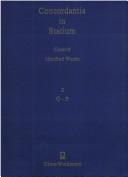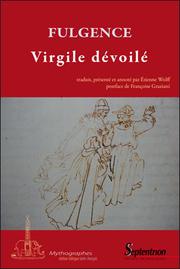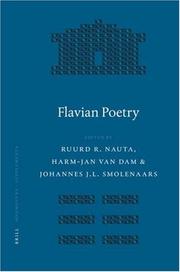| Listing 1 - 10 of 36 | << page >> |
Sort by
|
Book

Year: 1600 Publisher: Parisiis: ex officina Plantiniana, apud Hadrianum Perier,
Abstract | Keywords | Export | Availability | Bookmark
 Loading...
Loading...Choose an application
- Reference Manager
- EndNote
- RefWorks (Direct export to RefWorks)
Book
ISBN: 9789004528413 9004528415 Year: 2023 Publisher: Leiden: Boston: Brill,
Abstract | Keywords | Export | Availability | Bookmark
 Loading...
Loading...Choose an application
- Reference Manager
- EndNote
- RefWorks (Direct export to RefWorks)
"The Silvae by Statius dethroned Virgil from the Studio in Naples, fostered the creation of a new genre, offered a model for court poetry, and seduced the most prestigious Humanists in the most vibrant centres of Renaissance Italy and the Netherlands. The collection preserves magnificent buildings otherwise lost; speaks of stones otherwise unknown; and memorializes people, rituals, and social relationships that would have passed into oblivion in silence. This volume offers a fresh look into approaches to the Silvae by editors and commentators, both at the time of the rediscovery of the poems and today"--

ISBN: 3487110474 9783487110479 Year: 2000 Publisher: Hildesheim: Olms-Weidmann,
Abstract | Keywords | Export | Availability | Bookmark
 Loading...
Loading...Choose an application
- Reference Manager
- EndNote
- RefWorks (Direct export to RefWorks)
Latin language --- Occasional verse, Latin --- Epic poetry, Latin --- Statius, P Papinius - (Publius Papinius)
Book
ISBN: 9789004207110 9004207112 900424512X Year: 2013 Volume: 354 Publisher: Leiden, Netherlands ; Boston, Mass. : Brill,
Abstract | Keywords | Export | Availability | Bookmark
 Loading...
Loading...Choose an application
- Reference Manager
- EndNote
- RefWorks (Direct export to RefWorks)
Winner of the 2015 Jozef IJsewijn Prize for best first book on a Neo-Latin topic Early modern commentaries on Statius’ Thebaid have been little studied; even that by Barth (1664-5), which holds a conspicuous place among them, has only been taken into account now and then, and often in a rather superficial way. The present book, which makes use of unpublished archival material, offers a comprehensive overview of these works (contexts, contents, interconnections). It is particularly interested in 16th-17th commentators and strives to give Barth’s achievement the attention it deserves. By closely looking at the various ways in which the commentaries respond to Statius’ poem, but also at the various kinds of discourse they present, it casts a new light on the reception of the Thebaid and on the early modern practice of commentary-writing. Les anciens commentaires imprimés de la Thébaïde de Stace ont été peu étudiés ; même celui de Barth (1664-5), qui occupe parmi eux une place éminente, n’a été pris en compte que de manière ponctuelle et souvent superficielle. Le présent ouvrage, étayé par des documents d’archives inédits, offre un examen général de ces travaux (contextes, contenus, filiations). Il s’intéresse particulièrement aux commentateurs des 16e-17e s. et s’efforce d’accorder à Barth l’attention qu’il mérite. En se penchant sur les différentes façons dont les exégèses répondent au poème de Stace, mais aussi sur les différents types de discours qu’elles présentent, il apporte un éclairage nouveau sur la réception de la Thébaïde et sur la pratique du commentaire au début de l’époque moderne.

ISBN: 9782757400913 2757400916 Year: 2009 Volume: 1148 Publisher: Villeneuve-d'Ascq : Presses universitaires du Septentrion,
Abstract | Keywords | Export | Availability | Bookmark
 Loading...
Loading...Choose an application
- Reference Manager
- EndNote
- RefWorks (Direct export to RefWorks)
Fulgence le Mythographe, auteur latin du 5e ou 6e siècle, était célèbre durant tout le Moyen-âge pour ses interprétations allégoriques des mythes antiques. Son commentaire de l'Énéide, traduit ici pour la première fois en français, a marqué durablement l'histoire de la culture européenne, et Dante en a tiré la figure romanesque de son Virgile, surgi du passé pour le guider à travers les ténèbres infernales. Virgile en personne vient ici expliquer la « substance » des figures et des noms poétiques, dans un dialogue avec son lecteur qui bouscule les habitudes. La lecture du poème ainsi dévoilé s'en trouve singulièrement renouvelée, car les allégories de Fulgence, soutenues par une pratique inventive de l'étymologie, sont faites pour surprendre.Pour donner au lecteur d'aujourd’hui les moyens d’entendre la méthode allégorique qui donnait sens à la parole « voilée » des anciens poètes, nous avons choisi de faire suivre l’Interprétation de Virgile de quelques textes médiévaux complémentaires, également inédits en français, et d’une postface synthétique situant ces textes dans la continuité des traditions philosophiques et littéraires qui depuis l’Antiquité n’ont cessé de défendre la profondeur et la liberté de l’imagination poétique.
Book
ISBN: 9788876422171 887642217X Year: 2007 Publisher: Pisa : Edizioni della Normale,
Abstract | Keywords | Export | Availability | Bookmark
 Loading...
Loading...Choose an application
- Reference Manager
- EndNote
- RefWorks (Direct export to RefWorks)
Héros (mythologie) --- Épopées latines. --- Dans la littérature. --- Stace (0040?-0096). --- Statius, P. Papinius (Publius Papinius). --- Stace
Book
ISBN: 9780192869272 9780192695994 0191965340 0192695983 0192695991 Year: 2023 Publisher: Oxford : Oxford University Press
Abstract | Keywords | Export | Availability | Bookmark
 Loading...
Loading...Choose an application
- Reference Manager
- EndNote
- RefWorks (Direct export to RefWorks)
In the essays of this volume, Michael Putnam shows how seriously Statius pays homage to his canonical predecessor, Virgil, how thoroughly he interprets the complexities of Virgilian poetry, and how he often, by placing a Virgilian reference in a different social and cultural context, boldly turns Virgil to new and more positive purposes. He focuses particularly, though not exclusively, on those Silvae which deal with the architectural world of Statius'society, the private villas, the gardens, and the imperial palace. He also writes of the Roman equivalent of the 'Grand Tour,' a young man's educational journey through the monuments of Egypt, Greece, and Asia Minor. The essays offer valuable insight into the cultural and social identity of late first-centuryimperial Rome. Statius' reverential but also heuristic engagement with Virgil emerges more distinctly across the interrelated essays. Putnam's collected essays display the pioneering nature of Statius' Silvae in the development of ecphrasis as an important social and literary mode in Roman poetry.
Stace (0040?-0096). --- Statius, P. Papinius (Publius Papinius). --- Virgile --- Influence. --- Statius, P. Papinius --- Virgil --- Criticism and interpretation. --- Statius, Publius Papinius
Book
ISBN: 9788862748032 8862748035 Year: 2017 Publisher: Alessandria : Edizioni dell'Orso,
Abstract | Keywords | Export | Availability | Bookmark
 Loading...
Loading...Choose an application
- Reference Manager
- EndNote
- RefWorks (Direct export to RefWorks)
Book
ISSN: 18723357 ISBN: 9004284702 9789004284708 9789004217898 9004217894 Year: 2015 Publisher: Leiden Boston
Abstract | Keywords | Export | Availability | Bookmark
 Loading...
Loading...Choose an application
- Reference Manager
- EndNote
- RefWorks (Direct export to RefWorks)
Brill’s Companion to Statius is the first companion volume to be published on arguably the most important Roman poet of the Flavian period. Thirty-four newly commissioned chapters from international experts provide a comprehensive overview of recent approaches to Statius, discuss the fundamental issues and themes of his poetry, and suggest new fruitful areas for research. All of his works are considered: the Thebaid , his longest extant epic; the Achilleid , his unfinished epic; and the Silvae , his collected short poetry. Particular themes explored include the social, cultural, and political issues surrounding his poetry; his controversial aesthetic; the influence of his predecessors upon his poetry; and the scholarly and literary reception of his poetry in subsequent ages to the present.
Statius, P. Papinius --- Estacio --- Stace --- Statius, Papinius --- Statius, Publius Papinius --- Stat︠s︡iĭ, Publiĭ Papiniĭ --- Стаций, Публий Папиний --- Criticism and interpretation. --- Stazio --- Littérature latine --- Critique et interprétation. --- Stace, --- Stace (0040?-0096). --- Statius, P. Papinius. --- Statius, Publius Papinius, --- Statius, Publius Papinius. --- Epic poetry, Latin --- History and criticism --- Criticism and interpretation --- Statius, P. Papinius - (Publius Papinius) - Criticism and interpretation --- Statius, P. Papinius - (Publius Papinius)

ISBN: 9047417712 9789047417712 9004147942 9789004147942 Year: 2006 Publisher: Leiden: Brill,
Abstract | Keywords | Export | Availability | Bookmark
 Loading...
Loading...Choose an application
- Reference Manager
- EndNote
- RefWorks (Direct export to RefWorks)
The reign of the Flavian emperors (69-96) saw the production of a large and varied body of Latin poetry: the epics of Valerius Flaccus, Silius Italicus and Statius, the Silvae of the same Statius, and the Epigrams of Martial. This poetry, long seen as derivative or decadent, is now increasingly appreciated for the daring originality of its responses both to the Latin literary tradition and to the contemporary Roman world. In the summer of 2003, the first-ever international conference on Flavian poetry, was held at Groningen, The Netherlands, bringing together leading scholars in the field from Europe, North America and Australasia. This volume offers a selection of the papers delivered on that occasion.
Latin poetry --- Latin literature --- History and criticism --- Epic poetry, Latin - History and criticism - Congresses --- Latin poetry - History and criticism - Congresses --- Statius, P. Papinius - (Publius Papinius) - Congresses --- Martial - Congresses --- Pliny, - the Younger - Congresses --- Epic poetry, Latin --- Statius, P. Papinius - (Publius Papinius) --- Martial --- Pliny, - the Younger
| Listing 1 - 10 of 36 | << page >> |
Sort by
|

 Search
Search Feedback
Feedback About UniCat
About UniCat  Help
Help News
News